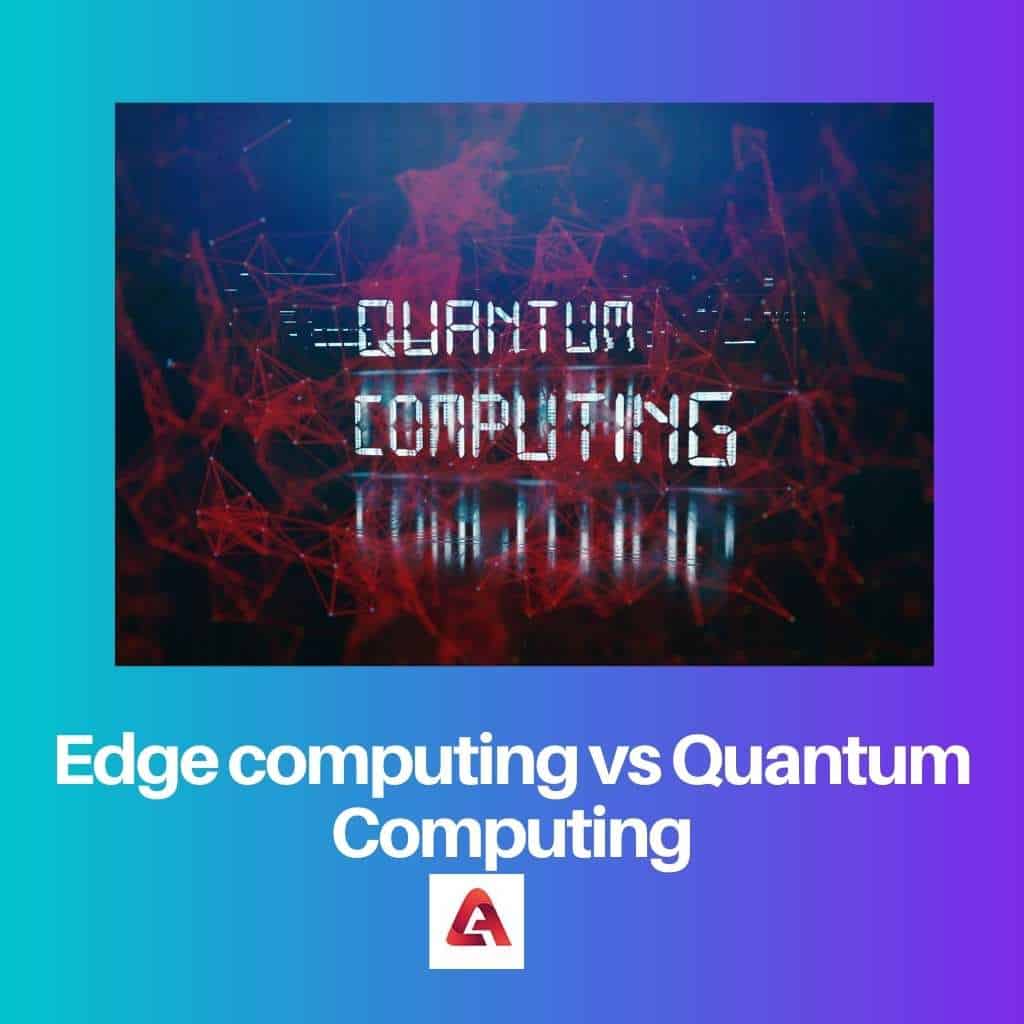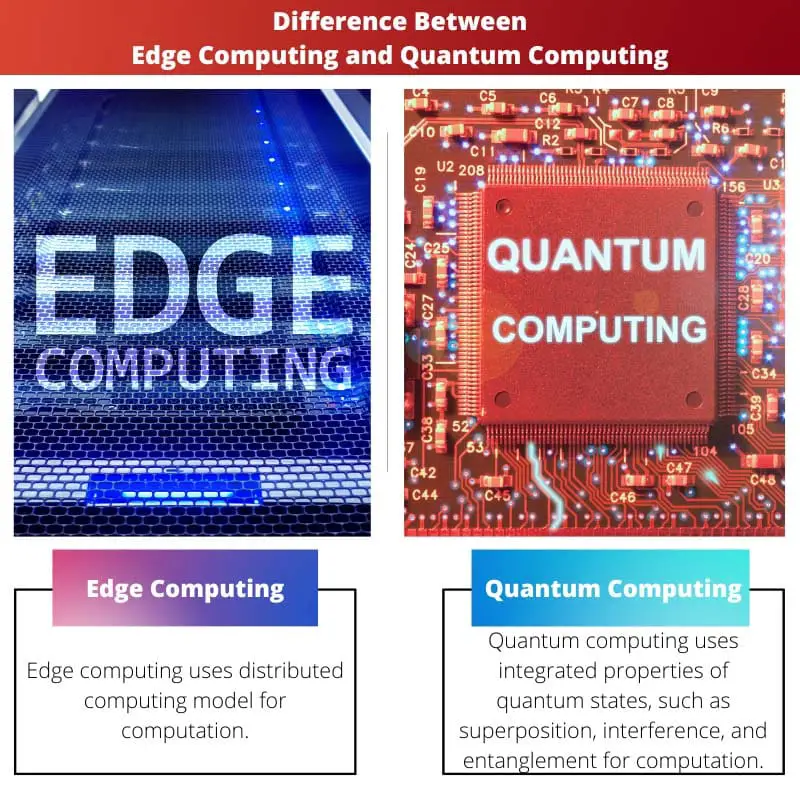Computing devices and the transmission speed of data are significant factors for businesses as it helps in solving problems.
But, due to reaching the physical limit of miniaturization of computing devices and transmission speed of data, another means of processing is developed.
Classical computing is linear in nature, so it may not work efficiently with the eminent amount of data. Therefore, edge computing and quantum computing come into play.
Key Takeaways
- Edge computing processes data closer to the source, improving response time and bandwidth usage; quantum computing relies on quantum bits (qubits) for exponentially faster calculations than classical computers.
- Edge computing enhances IoT applications and real-time data analysis; quantum computing focuses on solving complex problems in cryptography, optimization, and simulations.
- Edge computing faces challenges in security and standardization; quantum computing grapples with stability, error correction, and scaling issues.
Edge computing vs Quantum Computing
Edge computing is the practice of processing and storing data near the devices where it is generated, such as IoT devices or mobile phones. Quantum computing is a type of computing that uses quantum-mechanical phenomena, such as superposition and entanglement, to perform computations.

Edge computing is distributed computing model for computation that keeps computation along with data storage near sources of data. It is considered to be developed to improve response time and save bandwidth.
Mostly, IoT and edge are compared with each other and mistook for each other. However, IoT is an abstract concept of edge computing.
Quantum computing is another type of computation that uses integrated properties of quantum states, such as superposition, interference, and entanglement for computation.
Though it is developed for faster computation, quantum computing may not able to solve some computations. However, it would solve integer factorization faster than classic computers.
Although, it could do much more than classical computers.
Comparison Table
| Parameters of comparison | Edge computing | Quantum Computing |
|---|---|---|
| Definition | Edge computing uses distributed computing model for computation. | Quantum computing uses integrated properties of quantum states, such as superposition, interference, and entanglement for computation. |
| Developed | Edge computing’s origin takes back to the 1990s. | Quantum computing began in 1980. |
| Focus | Edge computing focuses on data-driven insight along with a faster response rate and good user experience. | Quantum computing focuses on data analytics and finding optimum solutions. |
| Extension | Edge computing is an extension of cloud technology. | Quantum computing is not an extension, nevertheless, it’s a type of computing itself. |
| Use | Edge computing is being used in IoT and Industrial IoT. | Quantum computing is being used in computational chemistry, and research fields. |
What is Edge Computing?
Technology is ever-evolving due to the ever-changing needs of facing new complexities and problems.
The classic computers can handle the sheer amount of data and provide solutions for the problems faced by organizations these days.
To handle the eminent amount of data and solve accordingly, edge computing is developed.
Edge computing is a distributed computing model that is used for computation while keeping data storage closer to sources of data.
As the classic computers are not capable of handling the sheer amount of data and involved complexities. Thus, edge computing is developed.
The increased processing power is the major priority of the companies as it ensures a faster response rate and accessibility. Meanwhile, Edge computing provides both of them.
Additionally, transmitting eminent data over computer networks was a problem, but it is resolved by edge computing by maintaining data analysis closer to the source.
Moreover, the benefit of edge computing was faster response time and it saves bandwidth as well.
However, there’s a misconception of edge computing being synonymous with IoT, although IoT is the abstract concept of edge computing.
Furthermore, Edge computing was developed in the 1990s and is an extension of cloud technology. And it is very different from the quantum computation.

What is Quantum Computing?
Due to the linear nature of conventional computers, some complexities and bigger data are not being handled efficiently by them.
To be able to work with a sheer amount of data along with complexities, quantum computing is developed.
In comparison to conventional computers, quantum computing carries out multiple calculations simultaneously while minding the complexities. Therefore, the results are more efficient.
Quantum computing is another type of computation that uses integrated properties of the quantum states, such as superposition, interference, and entanglement for computation.
In fact, for carrying out a computation, it is required to use quantum computers. However, it is developed to take over conventional computers, it might not able to do so.
But, Quantum computers can do integer factorization much faster than classic computers. Practically, it may not outperform classic computers, but it would be able to do certain computations much faster than them.
Moreover, quantum computers follow the Church-Turing thesis, therefore a quantum computer would solve every possible computation similar to a classic computer and vice versa.
Although, a quantum computer has lower time complexities as compared to a classic computer. Indeed, a quantum computer offers similar utilities as a classic computer.
Furthermore, Quantum computing was started in the 1980s and it is not an extension of any technology. Additionally, it is very different from edge computing.

Main Differences Between Edge Computing and Quantum Computing
An alternative method of processing has been developed because of the linear nature of classic computers.
As the data size is eminent along with complexities which makes it harder to solve for classic computers, thereby resulting in late response time and experience of users.
Then, edge computing and quantum computing come into play for improved response time and saves bandwidth. However, they are very different from each other.
- Edge computing uses distributed computing model for computation. Meanwhile, Quantum computing uses integrated properties of quantum states, such as superposition, interference, and entanglement for computation.
- Edge computing’s origin takes back to the 1990s, while Quantum computing began in 1980.
- Edge computing focuses on data-driven insight along with a faster response rate and good user experience. Meanwhile, Quantum computing focuses on data analytics and finding optimum solutions.
- Edge computing is an extension of cloud technology, while Quantum computing is not an extension, nevertheless, it’s a type of computing itself.
- Edge computing is being used in IoT and Industrial IoT, while Quantum computing is being used in computational chemistry, and research fields.

References
- https://onlinelibrary.wiley.com/doi/abs/10.1002/itl2.275
- https://www.hindawi.com/journals/complexity/2020/8216874/
